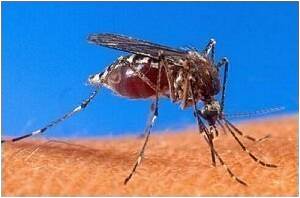A recent study finds that Anopheles gambiae mosquito is able to smell major human host odorants better at night.

The team also included Matthew M. Champion, Eck Institute for Global Health Research Assistant Professor in the Department of Chemistry and Biochemistry, who specializes in proteomics.
Zain Syed, left, Sam Rund, Matt Champion and Giles Duffield synchronize their research Zain Syed, left, Sam Rund, Matt Champion and Giles Duffield synchronize their research
This study utilized mass spectrometry to quantify protein abundance in mosquito sensory organs, and electroantennograms to determine the response induced by host odorants at different times of the day. The coincident times of peak protein abundance, olfactory sensitivity and biting behavior reflect the extraordinarily fine-tuned control of mosquito physiology. Olfactory protein abundance and olfactory sensitivity are high when needed (at night) and low when not required (daytime).
Samuel Rund, a doctoral candidate in the laboratory of Duffield and a former Eck Institute for Global Health Fellow, and Nicolle Bonar, a visiting undergraduate student from Queens University of Ontario, Canada, were the lead authors on this research. The Notre Dame team also included then-undergraduate student John Ghazi, Class of 2012; undergraduate Cameron Houk, Class of '14; and graduate student Matthew Leming.
Rund noted, "This was an exciting opportunity to bring many people and techniques together to make some really fascinating findings on the mosquito's ability to smell humans, its host. Just think, during the day the mosquito is sleeping and doesn't need to smell you. But when the sun goes down, the mosquito's olfactory system becomes extra-sensitive, and she is ready to smell and then bite you."
Advertisement
Rund and Duffield's earlier work with collaborator James Gentile from Notre Dame's Department of Computer Science and Engineering, "Extensive circadian and light regulation of the transcriptome in the malaria mosquito Anopheles gambiae," helped lay some of the foundation to their findings. The paper, published in BMC Genomics in April, further examined the regulation of rhythms in gene expression at the molecular level, highlighted important differences in biological timing between Anopheles gambiae and the important dengue vector, Aedes aegypti, and highlighted the important role of light in organizing and modifying gene expression.
Advertisement
Source-Eurekalert










